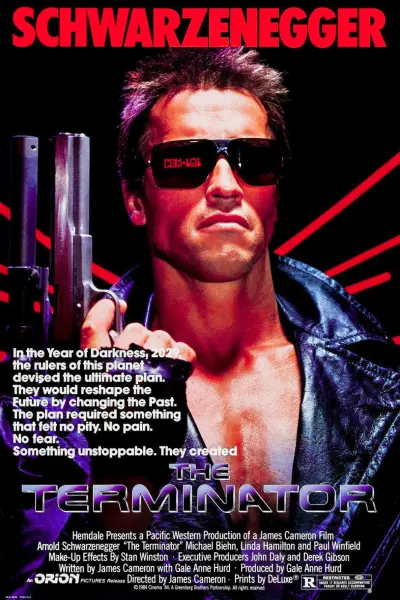
Imagine a world where the lines between humanity and machines become blurred under the unstoppable march of artificially intelligent forces. This chilling reality is portrayed in "The Terminator," a thrilling sci-fi film directed by the visionary James Cameron.
Released in 1984, the movie expertly blends action, suspense, and existential contemplation. It begins with two warriors sent back in time from a dystopian future, where machines led by Skynet wage war against humanity. One is a relentless cyborg known as the Terminator (played with iconic stoicism by Arnold Schwarzenegger) tasked with eliminating Sarah Connor (Linda Hamilton), whose unborn son is destined to become the savior of mankind. The other is Kyle Reese (Michael Biehn), a human resistance fighter sent to protect her at all costs. This premise sets the stage for a relentless chase and lays the foundation for a series that has become a staple of the sci-fi genre.
At the core of "The Terminator's" storyline is the exploration of the potential horrors that can arise from unchecked technological progress. As the Terminator cuts through 1980s Los Angeles with cold efficiency, a palpable tension emerges between technological prowess and the human spirit. The film operates as a cautionary tale, where the central theme of man versus machine extends beyond mere survival to encompass the essence of what it means to be human.
This theme is embodied in the characters' struggles, highlighting the contrast between the warmth of human connections and the backdrop of a cold, calculated mission to destroy. Cameron skillfully depicts the bleak future through harrowing flashbacks experienced by Reese. This stylistic choice not only builds the post-apocalyptic world but also establishes the narrative stakes on a visceral, emotional level. By showing audiences glimpses of a future that could be the consequence of present actions, the film serves as a warning and a call to action. The nightmarish scenes are etched into the viewers' minds, making the threat feel eerily real.
The relationship between Sarah Connor and Kyle Reese develops amidst frenetic chases and close encounters with the seemingly indestructible Terminator. As their bond deepens, Sarah's transformation from a naive waitress to a determined fighter becomes evident, showcasing the human capacity for growth and resilience. Reese's unwavering dedication to the mission, and later to Sarah, emphasizes themes of sacrifice and love, adding depth to the otherwise dark narrative. In a story filled with intense action, these intimate human moments serve as rays of light, demonstrating that even in the most dire situations, human connection remains a powerful force.
"The Terminator" is often recognized as a benchmark for its special effects and makeup, pioneering the use of practical effects and animatronics. However, these visuals serve a greater purpose than mere spectacle. Each robotic framework and explosion serves as a storytelling device, contributing to the overarching narrative themes of technological terror and the human will to persevere. Furthermore, the state-of-the-art effects of that era lend credibility to the film's ominous warnings about a future controlled by machines, making these grim fantasies disturbingly close to reality.
Moreover, "The Terminator" transcends its surface-level narrative to explore deeper philosophical questions. The concept of predestination versus free will is a persistent thread, with characters grappling with a future seemingly set in stone. Can Sarah change the course of history? Does knowing one's destiny compel or paralyze? The movie cleverly avoids providing definitive answers, instead prompting viewers to reflect on the consequences of collective choices and the power they have over their own destinies.
It is this combination of heart-stopping action and profound inquiry that makes "The Terminator" a thought-provoking, enduring piece of cinema, as relevant today as it was when it first stormed onto the silver screen.

